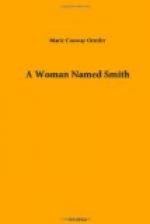“Stop trying to argue with me, my dear man,” she’d say in her rich voice, “but come and let us reason together. I haven’t heard one word of reason from you yet!” And she’d let loose one of her rollicking laughs that set the doctor’s teeth on edge and made The Author shudder. The Author snarled to me that she laughed like a rolling-mill and reasoned like a head-on collision. He put her in his new book, clothes and all. Just as Luis Morenas, with an edged smile on his thin lips, made rapid-fire sketches of her. He called her “The Future-Maker.”
Now, shouldn’t Alicia and I have been happy? And yet we weren’t. Alicia’s laugh wasn’t so frequent. I would catch her watching me, with an odd, troubled, anxious speculation in her eyes. She had a habit of blushing suddenly, and as quickly paling. And quietly, but none the less surely and definitely, she had begun to avoid Doctor Richard Geddes. It wasn’t that she ceased to be friendly; but she placed between herself and him one of those women-built, impalpable, impassable barriers which baffled, puzzled men are unable to tear down. It was impossible, I thought, that she should remain blind to his open passion for herself: he was anything but subtle, was Richard of the Lionheart. A blind man could have told, from the mere sound of his voice, a deaf man from the mere expression of his eyes, that Alicia had the big doctor’s whole heart.
On his side, he was in deep waters. His ruddy color faded; his face took on a fixed, grim intensity. And when he watched the girl flirting now with this boy, now with that, after the innocent fashion of natural girls, but always reserving a friendlier smile, a more eager greeting, for Mr. Nicholas Jelnik, I was so sorry for Doctor Richard that I couldn’t help trying, covertly, to console him.
It so happened that Miss Emmeline Phelps-Parsons, daughter of the Puritans though she was, nevertheless had a distinct liking for what she termed Episcopacy. She was pleased with old St. Polycarp’s. She liked Mrs. Haile, to whom she happened to mention that her opportunities for studying the life of native women and children in the East had been rather unusually good, since she had visited many missionary stations in China and India. Things were languishing just then, and Mrs. Haile looked at Miss Emmeline almost imploringly: would she, could she, give the ladies a little lecture?—tell us things first-hand, so to speak?
Miss Emmeline reflected. She looked at Alicia and me.
“Could we have it in your delightful library?” she wondered. “That beautiful old room has a soul which speaks to mine. Dear Miss Smith, would it be too much to ask you to let me have my little talk, a very informal little lecture, in wonderful old Hynds House?”
Mrs. Haile turned a sort of greenish pink. It wasn’t for her to suggest, after that, that it might be better to have the lecture in the parsonage; any more than for me to hint, without ungraciousness, that it might be just as well not to have it in Hynds House. Alicia shot me one quizzical, Irish-blue glance when I said, “Yes.”




